#more worldbuilding.
Explore tagged Tumblr posts
Text
begging for more interesting worldbuilding conversation fr. like i wanna know what the zodiac equivalent is. do people flex that they were born under the warrior or the maiden’s star? let me know about the essos-westeros spice trade. what about valyrian epics? were they influenced by earlier ghiscari literature? what about the art. where are all the art movements in westeros.
#asoiaf#guava.txt#more worldbuilding.#westeros renaissance takes place in highgarden then moves to oldtown#tyrell bastard botticelli#also more on non-maester written literature. the personal diaries poets etc let’s hear abt them#the riverlands is where expressionism begins. a generation born out of war in a region built by war.#riverlands art would be inherently political. no academic painters there! portraying emotional portrayals not reality#asoiaf worldbuilding
109 notes
·
View notes
Text
Something that completely flew over my head (I am not very observant), I was rereading chapter 87: Winged Lion II to re-check some things about dungeons and I just now realized the ancient humans weren't from the current races we know.
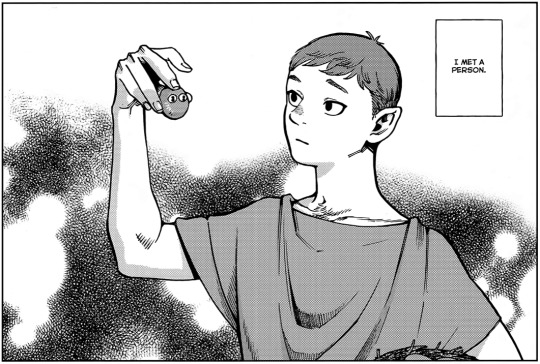
They seem to have characteristics from several of the human races together, and some of them even seem to have fur (like demi-humans?)
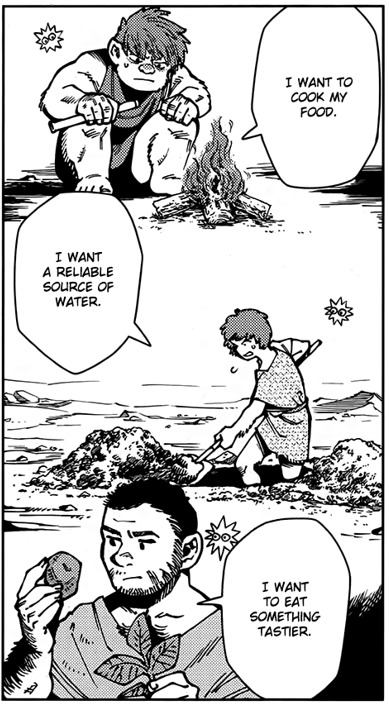
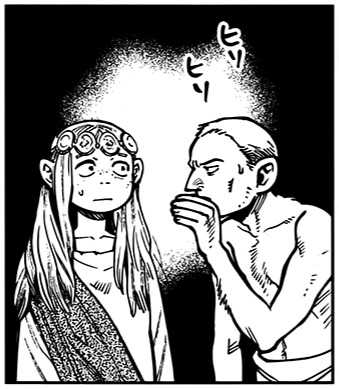
It's even implied that the lifespan differences and physical differences (the two asking for muscles and using magic in the background) were due to the Demon granting wishes
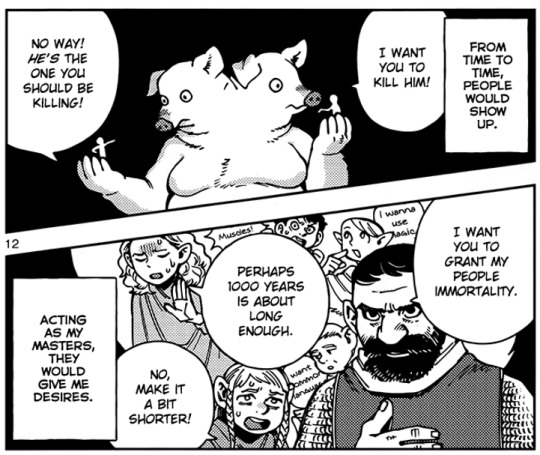
I did notice this part but I didn't realize this was probably part of the source of the race differences rather than the races already being different and wishing for different things.
So at some point the human races might have been even more closely related, before a powerful being influenced their evolution.

#dungeon meshi#dungeon meshi spoilers#dunmeshi thoughts#major spoilers#Dungeon Meshi races#worldbuilding#Winged Lion#Demon#fantasy worldbuilding#I probably only noticed this now cause I became more used to the races while writting this blog#so the shorter pointy ear the fur and the tall gnome looking humans called my attention#I unfortunately dont pay much attention to how characters look usually
7K notes
·
View notes
Text


Splatoon worldbuilding stuff!
I always loved seeing people’s headcannons on daily life and stuff, so it’s finally time I made some of my own.
#splatoon#splatoon fanart#Splatoon worldbuilding#splatoon 3#slif art#there will be more of this I promise#It’s way too fun
2K notes
·
View notes
Text
"why don't super-intelligent Pokemon like Metagross and Alakazam just take over humanity if they're smarter than us" imagine that a random primate gave you free housing, food, and medical care for the rest of your life for literally no reason other than they want to be friends with you and I think you'll understand
#pokemon#pkmn#pokemon worldbuilding#outdesign posts things#maybe they just wanna be friends with us. ever consider that#the only time they would have a reason to beef with humanity would be like PLA times#and even that seems to be more of a 'stay off our territory and we'll stay off yours' kind of thing
5K notes
·
View notes
Note
Final manifestations for Book 7?
I'm trying REALLY hard not to build up any solid expectations, because I wanna go in ~fresh~! they're already so far away from anything I thought would happen (not in a bad way, I'm just accepting that I'm on Miss Yana's Wild Ride at this point and we're seeing this thing through 'til the end, by gum). so it's nothing too major, but:
they've been handing new crying expressions out like candy lately, I want to see some delicious Malleus tears.
honestly I want everyone to cry buckets. their tears sustain me. the more Silver angst specifically I get the happier I am.
SILVER!!!! 👏 VANROUGE!!!! 👏
just let him have this. the poor boy's been through so much. let him have his big "I'm proud of you, son" moment with Lilia.
I'm 100% expecting Grim's arc (and probably whatever's going on with Crowley) to be its own episode, but a nice hook to leave us hanging on would be good!
a nice hook though, please, I don't think I can take another "Grim is attacking us! now wait eight months to find out what happens :)" cliffhanger...
some Meleanor? as a treat? just a little bit, a tiny quick flashback or something, please Twst I just, I just want to see her again. let her have a little ghost cameo like Dawnathan Knight got. Lilia and his kids are all having their big group hug or whatever and she can gently fade in to be all like

(turning asks off until I'm done playing, SEE YOU ON THE OTHER SIDE Y'ALL)
#art#twisted wonderland#twisted wonderland spoilers#twisted wonderland episode 7 spoilers#twisted wonderland book 7 spoilers#twisted wonderland episode 7 part 13 spoilers#twisted wonderland book 7 part 13 spoilers#one last chance for me to be wrong about everything!#(no it's good i am enjoying it SO much) (just stomping right down on all of my personal like buttons with its whole weight)#(it's just also VERY good at totally subverting all of my expectations)#i don't think we're actually gonna get a permanently dehorned malleus though#just because it feels like an insane thing to remove the most iconic part of one of the most iconic characters of the game#but i could see like...a temporary thing ala raisin vil#or a permanent smaller change like cracks/chips or something (kintsugi horns would be super cool actually)#but i do think it's more likely we'll find some way to keep the status quo re:horn design#if this was the END-end of all of twst then maybe but they still wanna sell merch of this guy so they can't change his design TOO much#i am sorta wondering if he might get a bit of a power nerf though? take him down from ridiculously overpowered to just normal overpowered#idk they made a point of saying the horns were specifically what caused the weather stuff#and the weather stuff has been called out in particular as one of the reasons why mal being so stupidly magical makes him pretty unhappy#everyone's scared of him all the time and he has to actively try not to accidentally kill people when he gets upset#so. idk. maybe it was just a little worldbuilding. but i thought it was interesting they brought that up was all!#me: i'm not going to form any expectations (writes a whole thing speculating on the fate of malleus' horns)#look it's now or never okay#that end of episode rhythmic better be SO cute because i'm already losing my entire head over this
2K notes
·
View notes
Text
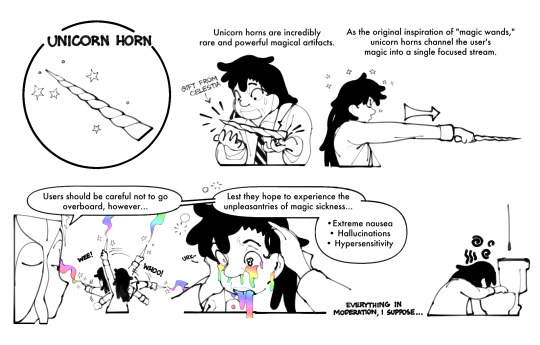
Quick worldbuilding comic about magical items.
#gonna do more of these#i'm trying to let myself be looser/less perfectionist#my art#comic#doodle#twilight sparkle#celestia#mlp#the grand galloping 20s#yes this was inspired by kui's worldbuilding comic doodles for dungeon meshi
4K notes
·
View notes
Text


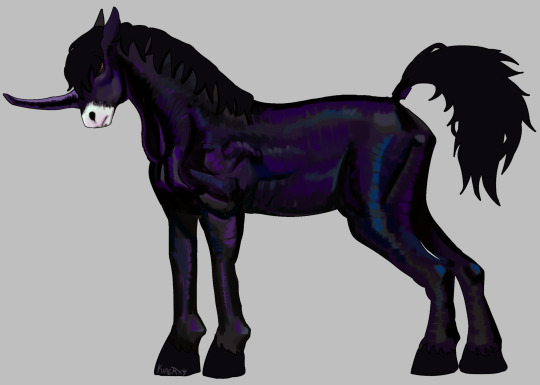
Honrses
#theyre supposed to be used as war montures and also for transportation like irl horses but they are not shy or afraid#so like theyre really hard to tame idk theyre just concepts still#honestly looking at them now they seem too horse like i'll probably redesign them to look more bulky like a rhino#so my idea is that unicorns exist in my setting but they went extinct and these are part of the same genus but lack magic qualities#and instead theyre more about raw force and impaling stuff#i will add them to my bestiary so i'll explain better when its time#wgd#worldbuilding#horse art#art#my art#digital art#dark fantasy
2K notes
·
View notes
Text
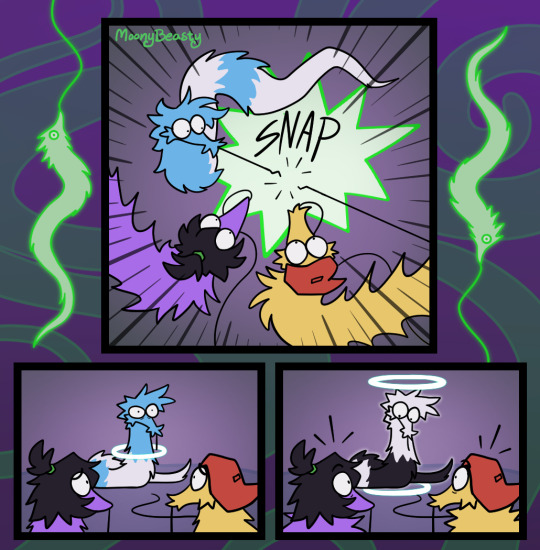
Worm on a string AU, ghosts are stringless worms.
---
When a worm meets the unfortunate fate of a snapped or cut string, it is typically the end for them.
However, for reasons yet to be widely known, a worm may persist as a Worm off the String.
P2, P3
Masterpost
#danny phantom#I kinda wanna do more with this and make it a real AU#Give it some actual worldbuilding#DannyPhantomWormAU#beastyart#comic#art
3K notes
·
View notes
Text
I think people tend to assume that any criticism of worldbuilding is ultimately a demand for a story to grind itself to a halt and give the reader 20 paragraphs of exposition, and like. Most of the time good-faith criticism of this nature is coming from a core aspect of the story not being grounded in the setting in a way that outright detracts from the story's quality. You fix it not by Explaining but by Showing it passively in the makeup of the world.
Like the last instance I saw this critique in was like 'you can't expect an author to stop and exposit the nuances of gender roles/Queerness in a fictional society' and it's like yeah I don't, and in fact this is actually one of the easiest things to show in the text without exposition. If a society has gender norms to begin with you'll see aspects of these norms baked into EVERYTHING. You'll see it in its stories, its religion, its taboos, its etiquette, its clothing, its family structures, its language, its insults, its labor, its leadership, etc. It will have massive impacts on how characters interact with one another and how they perceive themselves. It will help Shape your characters.
If you do this legwork to begin with for the core facets of your story, you will find very natural places for these concepts to be demonstrated without derailing the plot and with little to no exposition. THAT sort of thing is what's being asked of you.
#Extremely comprehensive worldbuilding about every facet of a society is ultimately just for fun. It's not necessary for good writing.#But if you're doing any form of speculative fiction you need to at least do the legwork for the things that drive the plot/characters#Your story won't work as well if you don't#Like if the central storyline in a spec fiction setting is a gay story arc I don't expect you to have the fucking salt economy#meticulously fleshed out to justify where and how your character got the salt offhandedly mentioned in a meal.#I DO expect you to have given more than superficial thought about gender norms.#(also for the gender norms example this Does Not just go for societies with a patriarchy or other gendered hegemony lol)
1K notes
·
View notes
Text

1K notes
·
View notes
Note
I know you had to delete them because people were mad at you, but your posts about r/worldbuilding inspired me and my brother to regularly browse the sub and send eachother the most insane things we see. Thank you for showing us this portal to the most absurd way to create fantasy.
I didn't delete it! that post is here . i still read it frequently.


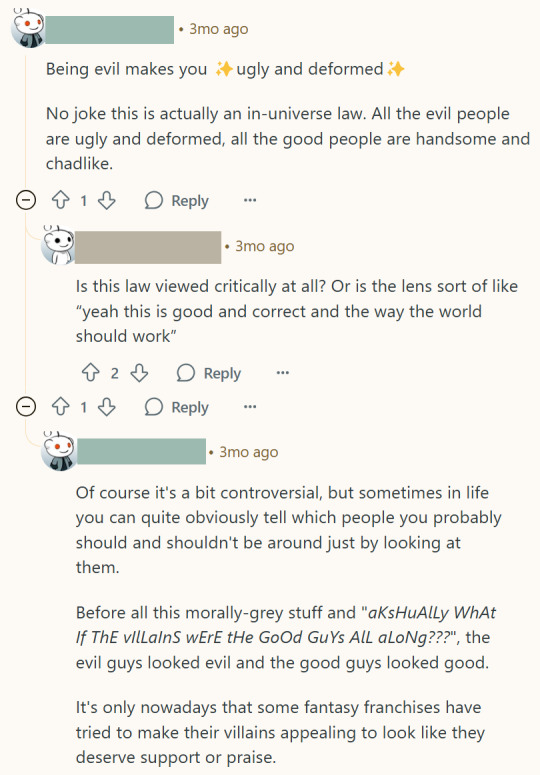
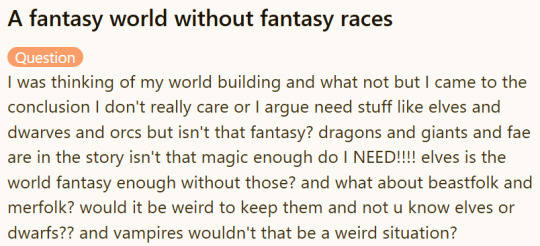
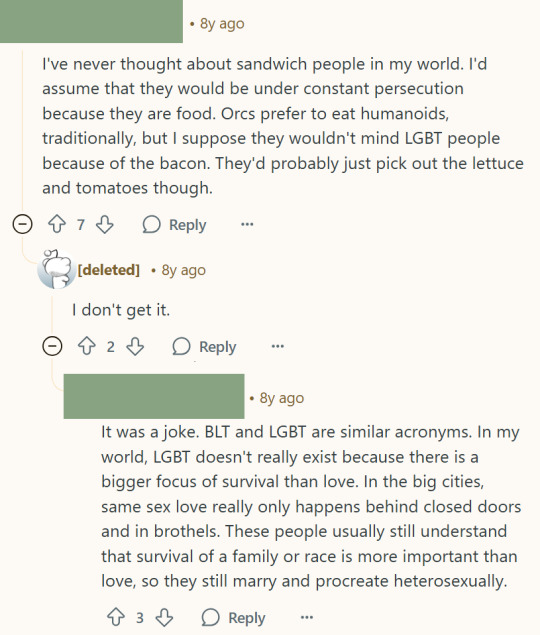
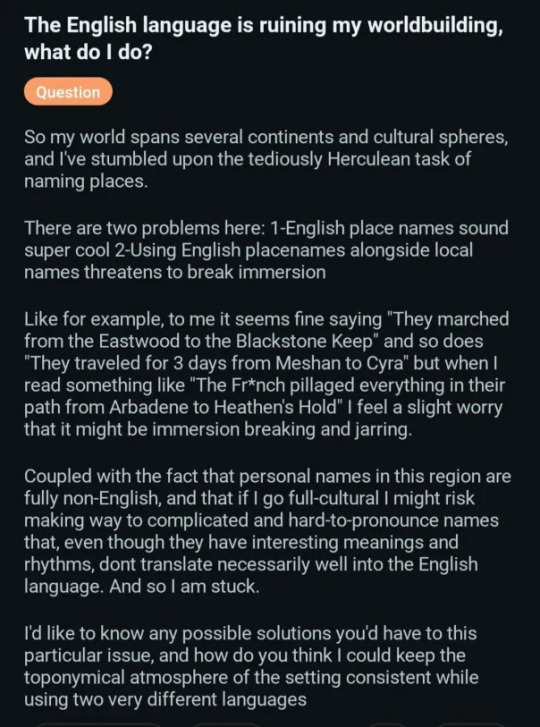

#talking tag#btw whenever queerness comes up you get a ton of people going 'ah that doesn't exist in my world because people have more pressing concerns#like gathering food and making babies'#or like 'well it's illegal so people know not to do it. it's therefore irrelevant to my worldbuilding'#or 'well my fantasy society is biologically predisposed to be heterosexual in almost every case so there's no reason to bring it up'#and it's like... ok well that all sounds like the one gay guy in town should be your main character...
573 notes
·
View notes
Text
looking for a new piece of xenofiction
ask the creator if their xenofiction is Watership Down or Warrior Cats
they don’t understand
pull out illustrated diagram explaining what is Watership Down and what is Warrior Cats
they laugh and say ‘It’s good xenofiction sir’
look inside
it’s Warrior Cats
#azureisms#and now for a nichepost that will appeal to approximately nobody#animal xenofiction#xenofiction#sorry to get pretentious in here tonight gang I just need to be a hater sometimes. for enrichment#Don’t get me wrong every person who got into xenofiction from Warrior Cats is a win in my book#Like I Was One Of Those#But you Start To Notice#Once you’ve read books where the animals Act Like Animals#How it was among the first patients of the 'little humans in wild animal costumes' curse#Like I signed up for animals…. where are the animals#Yea this is about published books written by Warrior Cats Youtubers who you can tell have never touched anything else in the genre#bc when you bite into the worldbuilding it tastes like wet cardboard#this is also about warriors rewrites that just anthropomorphize the cats more like we didn’t pick up the books in middle school#because we wanted to see wild cats being wild cats#but alas! that’s me complaining#DeviantArt wolf comics and sparklecat OCs are a staple of culture. I’m not your god. be free
664 notes
·
View notes
Text
Dungeon Meshi World Map
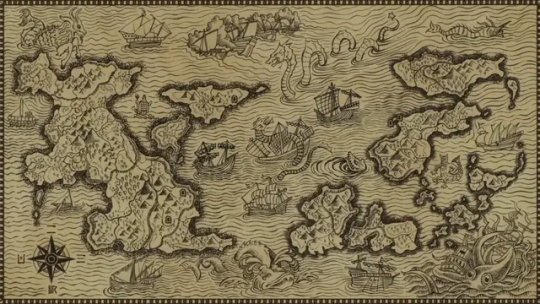
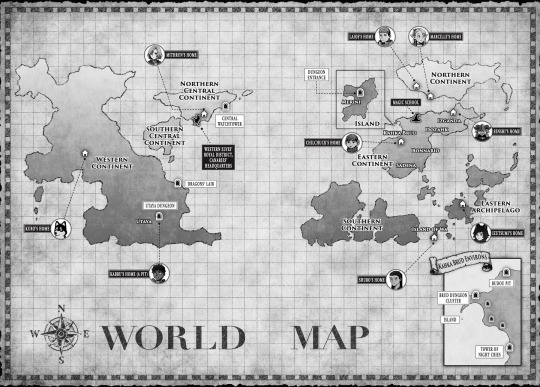
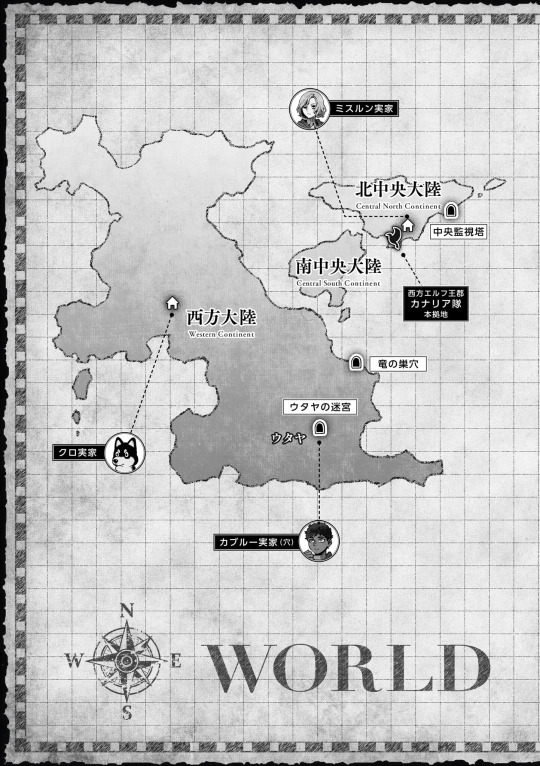
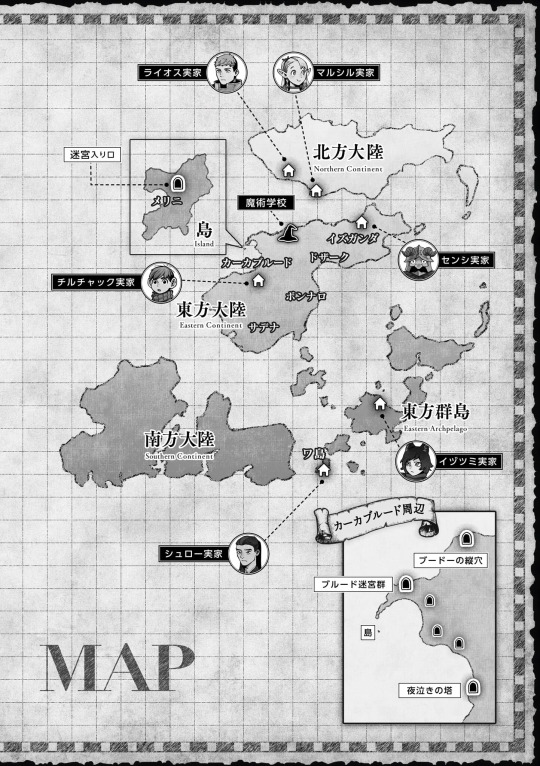
REGIONS (Descriptions taken from the Adventurer's Bible)
WESTERN CONTINENT
Description: Bears the most scars from the ancient war. It has many monsters and ruined dungeons, and although it's vast, there are surprisingly few habitable areas. Most of the inhabitants are sturdy, short-lived races and demihumans. Elven culture has had a strong influence here. Characters: Kabru and Kuro Places of Note: Utaya Dungeons of Note: The Utaya Dungeon, The Dragon's Lair
NORTHERN CENTRAL CONTINENT
Description: The continent that is home to the largest nation, ruled by the queen of the elves. The term "Western Elves" mostly indicates elves from this region. It's the safest area and life is easy here, but its shrinking population has dangerously weakened it. Characters: Mithrun (and the Canaries) Places of Note: Western Elves's Royal District, Canarie's Headquarters. Dungeons of Note: Central Watchtower
SOUTHERN CENTRAL CONTINENT
Description: The area with the second-largest elf nation. It has more inbound immigration than the Northern Central Continent and a rather disorganized atmosphere. While it's in an alliance with the Northern Central Continent, they really aren't on good terms. Characters: - Places of Note: - Dungeons of Note: -
EASTERN CONTINENT
Description: Home to the largest gnome nation. Once dwarfs and gnomes made up the majority of the inhabitants, but in recent years there has been an influx of short-lived races from the Northern Continent and Eastern Archipelago, and the population is growing rapidly. It's a melting pot where various cultures are jumbled together. Characters: Chilchuck Tims (Kahka Brud), Senshi (Izganda) Places of Note: Magic School, The Island/Melini, Kahka Brud, Izganda, Dozahk, Bonnario, Sadena Dungeons of Note: Island, Brud Dungeon Cluster, Budou Pit, Tower of Night Cries
NORTHERN CONTINENT
Description: A severely cold continent where over half of the land is covered in perpetual snow. The majority of the inhabitants are short-lived races, particularly tall-men, but the population isn't large to begin with. It has been strongly influenced by dwarf culture. Characters: Laios & Falin, Marcille Places of Note: - Dungeons of Note: -
EASTERN ARCHIPELAGO
Description: An area where short-lived races live. As a result of a pact, there has been no interference by long-lived races for a very long time. The effects of the ancient war are slight, and they have almost no trouble with monsters or dungeons, but there's constant strife among humans. Characters: (all from different Islands) Izutsumi, Shuro and his Retainers, Rinsha Fana (Not shown) Places of Note: Island of Wa Dungeons of Note: -
SOUTHERN CONTINENT
Description: Home to the largest dwarf city. Gnome and dwarf nations often build down rather than out, and the innermost layers are extraordinarily deep. War still erupts frequently, and there are never-ending disputes near the borders. Characters: - Places of Note: - Dungeons of Note: -
If you're interested I've found a post on pixiv with the map outlines and some more info (in japanese) (edit: translated here)
I'll make a post about the dungeon descriptions later (here) but here they are, there's a little more info about Kahka Brud dungeons on my last map post
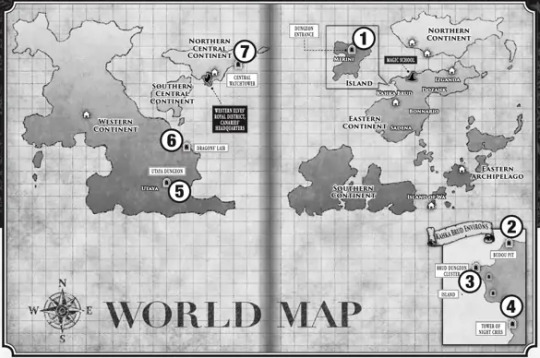
1 The Island, 2 Budou Pit, 3 The Brud Dungeon Cluster, 4 The tower of Night Cries 5 The Utaya Dungeon 6 The Dragon's Lair 7 The Central Watchtower
Map Outline
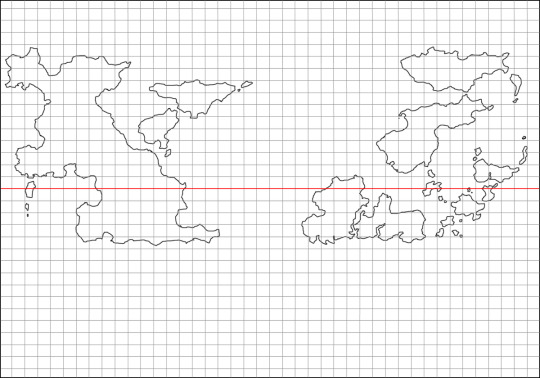
#dungeon meshi#dungeon meshi map#adventurers bible#maps#world map#Laios Touden#Marcille Donato#Senshi of Izganda#Chilchuck tims#Izutsumi#Toshiro Nakamoto#Kuro#Kabru of utaya#Utaya#The canaries#Mithrun#Edit: Shame on me I forgot to add one more map and a link to a pixiv post with the outlines#longpost#long post#worldbuilding#world building#fantasy map#fantasy world#for referencing
2K notes
·
View notes
Note
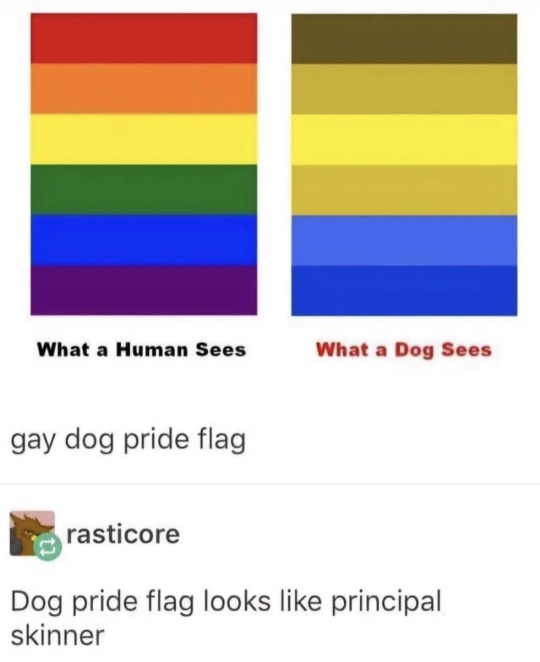
For your gay little dogs
.
#principal skinner pride flag for my gay little dogs#you see this is why my dog people need to see the same spectrum of colors we do#I feel like their literal world view would be drastically altered if they couldn't distinquish between orange and green#I'd argue that red is a significant color in practically every culture#it's instinctual associations with danger food and fertility make it attention grabbing on a visceral monkey brain level#I strongly suspect the impact would be at least somewhat negated if it was a muted brownish khaki instead#meaning it wouldn't be used in visual communication nearly as much#I would have to center my art and worldbuilding more around yellow and blue because those would be the colors the dogs would see clearly#right? is that sound logic?#and that would just make me immensely sad because warm colors are my favorites :<#answered#m0notropa-uniflora#something that continues to boggle my mind is that there are animals that see more colors than humans#we like to assume that our color vision is the best we can see it ALL look at that rainbow there that's the full set#yes primates are well equipped in this regard compared to many other mammals like dogs#but most birds for example have more color receptors in their eyes they have more tools to work with and their rainbow is even wider#it's like sound everyone knows we can't hear sounds that are impossibly low or too high#and we can't process wavelengths of light that are too long (infrared) or too short (ultraviolet)#only what lands between those bookends (called the visible spectrum) reads to our human eyes as “light” and subsequently “color”#I hope I've understood this correctly I'm trying to say that there's a whole layer of vision we don't have the hardware to get access to#and that's just wild to me like we are fundamentally unable to imagine a new color that isn't already included in our built-in selection#but they're definitely there the unimaginable colors are in the room with you and a common pigeon can see them#uv dlc not available for your system
575 notes
·
View notes
Text
I like that whenever you learn advanced bros attacks in Mario & Luigi: Superstar Saga, it shows that Mario has a keen mind for creative fighting techniques. Meanwhile, Mario and Luigi: Brothership balances things out by showing that Luigi is good at environmental puzzles and general problem solving.


Not only do Mario and Luigi's different areas of expertise make them a perfect team, but it also fits with the gameplay of their respective series in ways that feel extremely in-character.


Big fan.
#mario and luigi superstar saga#mario and luigi brothership#Mario#Luigi#Super mario brothers#Consistent worldbuilding? In MY Mario franchise? More likely than you think
746 notes
·
View notes
Text
Hey, Happy Last Day of 2024! We made it! 🎉
My New Year’s gift to myself is casting a malicious spell that makes you all HAVE to watch AMC’s Pantheon. It’s required.
It drives me crazy how few people know about this gem of a show. The characters are endearing and relatable, and the story plays with the boundaries of tech, fantasy, and AI anxiety with a lot of skill. One of the best sci-fi shows of the best decade, and AMC gave it absolutely zero advertising.
You can find it on Netflix, or by sailing the High Seas (if you know what I mean).

Good luck, and make sure you go into it blind! (TW for a few scenes of animated gore in the first couple episodes, and for themes of unreality and depersonalization.)
#pantheon amc#amc pantheon#also check out scavengers reign if you can handle a bit more horror and like creative biological worldbuilding#also please feel free to come gush to me about it once you’re done lol#wizardless posts
606 notes
·
View notes